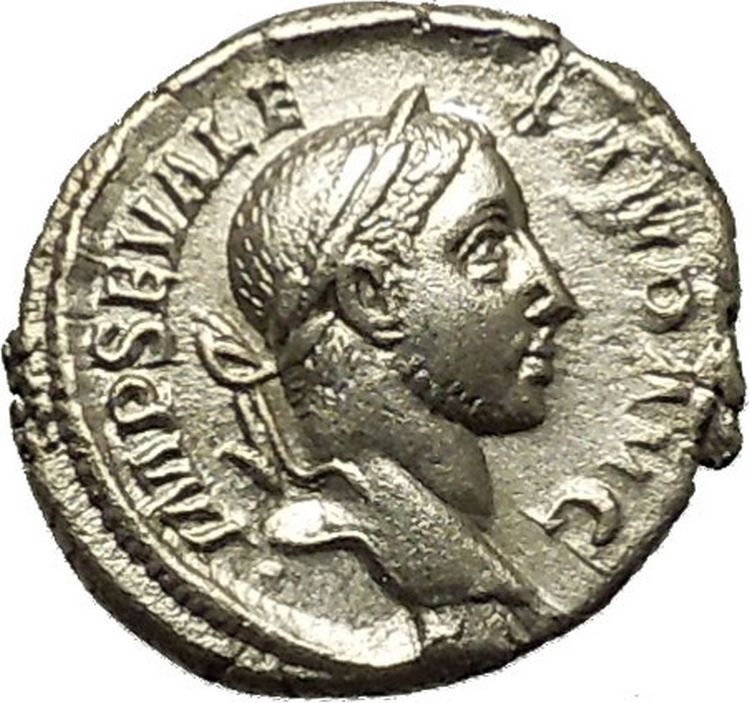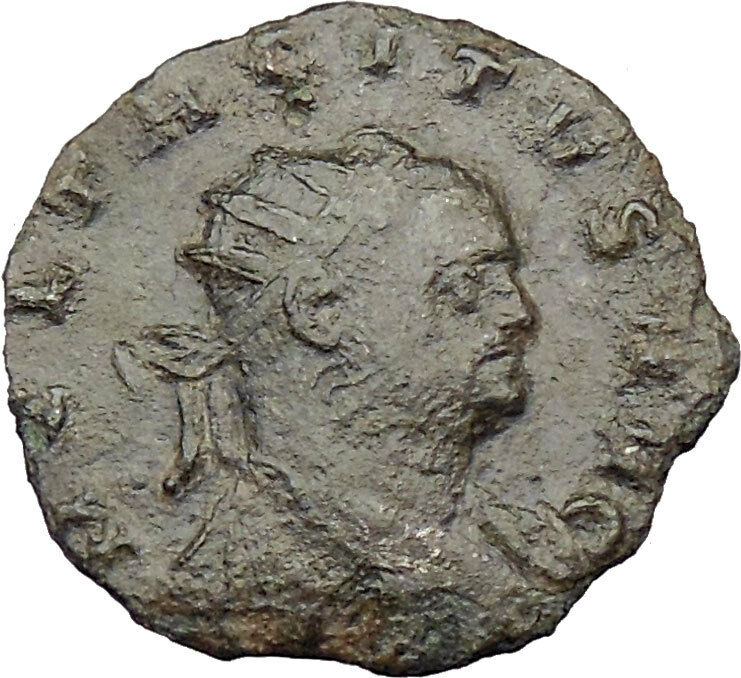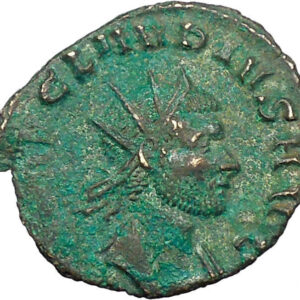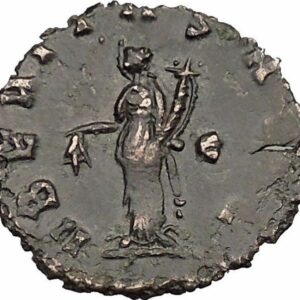|
Severus Alexander
–
Roman Emperor
: 222-235 A.D.
Silver Denarius 19mm (3.68 grams) Rome mint: 229 A.D.
Reference: RIC 92, BMC 603, C 365
IMPSEVALEXANDAVG – Laureate head right.
PMTRPVIIICOSIIIPP – Mars advancing left, holding branch and spear with shield.
You are bidding on the exact item pictured,
provided with a Certificate of Authenticity and Lifetime Guarantee of
Authenticity.
Mars (Latin:
Martis) was the
Roman
god of war
and also an
agricultural
guardian, a combination
characteristic of early
Rome
. He was second in importance only to
Jupiter
, and he was the most prominent of the
military gods in the
religion of the Roman army
. Most of his
festivals
were held in March, the month named
for him (MartiusLatin
), and in October, which
began and ended the season for military campaigning and farming.
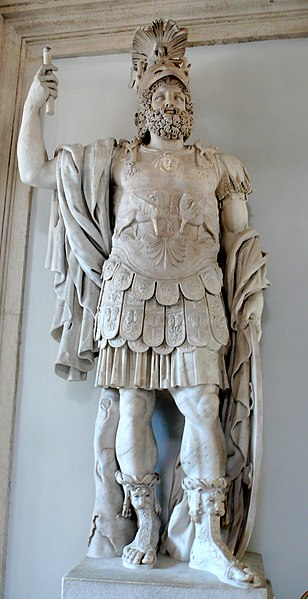
Mars was
identified with
the
Greek god
Ares, whose
myths
were reinterpreted in
Roman literature
and
art
under the name of Mars. But the character
and dignity of Mars differed in fundamental ways from that of his Greek
counterpart, who is often treated with contempt and revulsion in
Greek literature
.Mars was a part of the
Archaic Triad
along with Jupiter and
Quirinus
, the latter of whom as a guardian of
the Roman people had no Greek equivalent. Mars’ altar in the
Campus Martius
, the area of Rome that took its
name from him, was supposed to have been dedicated by
Numa
, the peace-loving semi-legendary second
king of Rome
. Although the center of Mars’
worship was originally located outside the sacred boundary of Rome (pomerium),
Augustus
made the god a renewed focus of
Roman religion
by establishing the Temple of
Mars Ultor in
his new forum
.
Although Ares was viewed primarily as a destructive and destabilizing force,
Mars represented military power as a way
to secure peace
, and was a father (pater)
of the Roman people. In the mythic
genealogy
and
founding myths of Rome
, Mars was the father of
Romulus and Remus
with
Rhea Silvia
. His love affair with
Venus
symbolically reconciled the two different
traditions of Rome’s founding; Venus was the divine mother of the hero
Aeneas
, celebrated as the
Trojan refugee
who “founded” Rome several
generations before Romulus laid out the city walls.
The importance of Mars in establishing religious and cultural identity within
the Roman Empire
is indicated by the vast number of
inscriptions
identifying him with a local
deity, particularly in the
Western provinces
.
Venus and Mars
The union of Venus and Mars held greater appeal for poets and philosophers,
and the couple were a frequent subject of art. In Greek myth, the adultery of
Ares and Aphrodite
had been exposed to ridicule when her
husband Hephaestus
(whose Roman equivalent was
Vulcan
) caught them in the act by means of a
magical snare. Although not originally part of the Roman tradition, in 217 BC
Venus and Mars were presented as a complementary pair in the
lectisternium
, a public banquet at which
images of twelve major gods of the Roman state
were presented on couches as if present and participating.

Wall painting (mid-1st century AD) from which the House of Venus and
Mars at
Pompeii
takes its name
Scenes of Venus and Mars in
Roman art
often ignore the adulterous
implications of their union, and take pleasure in the good-looking couple
attended by Cupid
or multiple Loves (amores). Some
scenes may imply marriage, and the relationship was romanticized in funerary or
domestic art in which husbands and wives had themselves portrayed as the
passionate divine couple.
The uniting of deities representing Love and War lent itself to
allegory
, especially since the lovers were the
parents of
Harmonia
. The Renaissance philosopher
Marsilio Ficino
notes that “only Venus
dominates Mars, and he never dominates her”.In ancient Roman and Renaissance
art, Mars is often shown disarmed and relaxed, or even sleeping, but the
extramarital nature of their affair can also suggest that this peace is
impermanent.
Sacred animals

She-wolf and twins from an altar to Venus and Mars
Temples and topography
The earliest center in Rome for cultivating Mars as a deity was the Altar of
Mars (Ara
Martis) in the
Campus Martius
(“Field of Mars”) outside the
sacred boundary of Rome (pomerium).
The Romans thought that this altar had been established by the semi-legendary
Numa Pompilius
, the peace-loving successor of
Romulus. According to Roman tradition, the Campus Martius had been consecrated
to Mars by their ancestors to serve as horse pasturage and an equestrian
training ground for youths.[49]
During the
Roman Republic
(509–27 BC), the Campus was a
largely open expanse. No temple was built at the altar, but from 193 BC a
covered walkway connected it to the
Porta Fontinalis
, near the office and archives
of the Roman censors
. Newly elected censors placed
their
curule chairs
by the altar, and when they had
finished conducting the census, the citizens were collectively
purified
with a suovetaurilia there. A
frieze
from the so-called
“Altar” of Domitius Ahenobarbus
is thought to
depict the census, and may show Mars himself standing by the altar as the
procession of victims advances.
The main Temple of Mars (Aedes
Martis) in the Republican period also lay outside the sacred boundary and
was devoted to the god’s warrior aspect. It was built to fulfill a vow (votum)
made by a
Titus Quinctius
in 388 BC during the
Gallic siege of Rome
.[53]
The founding day (dies
natalis) was commemorated on June 1, and the temple is attested
by several inscriptions and literary sources. The sculpture group of Mars and
the wolves was displayed there.Soldiers sometimes assembled at the temple before
heading off to war, and it was the point of departure for a major parade of
Roman cavalry
held annually on July 15.
A temple to Mars in the
Circus Flaminius
was built around 133 BC,
funded by
Decimus Junius Brutus Callaicus
from war booty.
It housed a colossal statue of Mars and a nude Venus.
The Campus Martius continued to provide venues for equestrian events such as
chariot racing
during the
Imperial period
, but under the first emperor
Augustus
it underwent a major program of urban
renewal, marked by monumental architecture. The Altar of Augustan Peace (Ara
Pacis Augustae) was located there, as was the
Obelisk of Montecitorio
, imported from
Egypt
to form the pointer (gnomon)
of the
Solarium Augusti
, a giant
sundial
. With its public gardens, the Campus
became one of the most attractive places in the city to visit.
Augustus chose the Campus Martius as the site of his new Temple to Mars Ultor,
a manifestation of Mars he cultivated as the avenger (ultor) of the
murder of Julius Caesar
and of the military
disaster suffered at the
Battle of Carrhae
. When the legionary standards
lost to the Parthians were recovered, they were housed in the new temple. The
date of the temple’s dedication on May 12 was aligned with the
heliacal setting
of the constellation
Scorpio
, the
house
of war. The date continued to be marked
with
circus games
as late as the mid-4th century AD.
A large statue of Mars was part of the short-lived
Arch of Nero
, which was built in 62 AD but
dismantled after Nero
‘s suicide and disgrace (damnatio
memoriae).
Mars Quirinus

Mars celebrated as peace-bringer on a Roman coin issued by
Aemilianus
Mars was the
Roman
god of war
, the son of
Juno
and
Jupiter
, husband of
Bellona
, and the lover of
Venus
. He was the most prominent of the
military
gods that were
 worshipped worshipped
by the
Roman legions
. The martial Romans considered him second in importance only
to Jupiter (their main god). His
festivals
were held in
March
(named for
him) and October. As the word Mars has no
Indo-European
derivation, it is most likely the
Latinised
form of the agricultural
Etruscan
god Maris
. Initially Mars was a Roman god of
fertility
and vegetation
and a protector of cattle, fields and boundaries and farmers. In
the second century BC, the conservative
Cato the Elder
advised “For your cattle, for them to be healthy, make this
sacrifice to Mars Silvanus you must make this sacrifice each year”.
Mars later became associated with battle as the growing
Roman
Empire
began to expand, and he came to be identified with the
Greek
god Ares
.
Unlike his Greek counterpart, Mars was generally revered and rivaled Jupiter as
the most honoured god. He was also the
tutelary
god of the city of Rome. As he was regarded as the legendary father
of Rome’s founder,
Romulus
, it was believed that all Romans were descendants of Mars.
SEVERUS ALEXANDER
 Augustus: Augustus:
A.D. 222-235
Caesar: A.D. 221-222 under Elagabalus
Son of Julia Mamaea
Husband of Orbiana
Grandson of Julia Maesa
Nephew of Julia Soaemias
Cousin of Elagabalus
Second-cousin of Caracalla and Geta
Great-newphew of Septimius Severus and Julia Domna
Marcus
Aurelius Severus Alexander (October 1, 208–March 18, 235 AD), commonly
called Alexander Severus, was the last
Roman emperor
(11 March 222–235) of the
Severan dynasty
. Alexander Severus succeeded his cousin,
Elagabalus
upon the latter’s assassination in 222 AD, and was ultimately assassinated
himself, marking the
epoch event
for the
Crisis of the Third Century
—nearly fifty years of disorder, Roman civil
wars, economic chaos, regional rebellions, and external threats that brought the
Empire to near-collapse.
Alexander Severus was the
heir
apparent
to his cousin, the eighteen-year-old Emperor who had been murdered
along with his mother by his own guards—and as a mark of contempt, had their
remains cast into the
Tiber river
. He and his cousin were both grandsons of the influential and
powerful Julia Maesa
, who had arranged for Elagabalus’ acclamation as Emperor by the
famed
Third Gallic Legion
.
A rumor of Alexander’s death circulated, triggering the assassination of
Elagabalus.
Alexander’s reign was marked by troubles. In military conflict against the
rising
Sassanid Empire
, there are mixed accounts, though the Sassanid threat was
checked. However, when campaigning against
Germanic tribes
of
Germania
,
Alexander Severus apparently alienated his legions by trying diplomacy and
bribery, and they assassinated him.
Life
Alexander was born with the name Marcus Julius Gessius Bassianus Alexianus.
Alexander’s father,
Marcus Julius Gessius Marcianus
was a Syrian
Promagistrate
. His mother
Julia Avita Mamaea
was the second daughter of
Julia
Maesa
and Syrian noble
Julius Avitus
and maternal aunt of Emperor
Elagabalus
.
He had an elder sister called Theoclia and little is known about her.
Alexander’s maternal great-aunt was empress
Julia
Domna
(also Maesa’s younger sister) and his great-uncle in marriage was
emperor Lucius
Septimius Severus
. Emperors
Caracalla
and
Publius Septimius Geta
, were his mother’s maternal cousins. In 221,
Alexander’s grandmother, Maesa, persuaded the emperor to adopt his cousin as
successor and make him
Caesar
and Bassianus changed his name to Alexander. In the following
year, on March 11, Elagabalus was murdered, and Alexander was proclaimed emperor
by the
Praetorians
and accepted by the Senate.
When Alexander became emperor, he was young, amiable, well-meaning, and
entirely under the dominion of his mother. Julia Mamaea was a woman of many
virtues, and she surrounded the young emperor with wise counsellors. She watched
over the development of her son’s character and improved the tone of the
administration. On the other hand, she was inordinately jealous. She also
alienated the army by extreme parsimony, and neither she nor her son were strong
enough to impose military discipline. Mutinies became frequent in all parts of
the empire; to one of them the life of the jurist and praetorian praefect
Ulpian
was
sacrificed; another compelled the retirement of
Cassius
Dio
from his command.
On the whole, however, the reign of Alexander was prosperous until the rise,
in the east, of the
Sassanids
. Of the war that followed there are various accounts. (Mommsen
leans to that which is least favourable to the Romans). According to Alexander’s
own dispatch to the senate, he gained great victories. At all events, though the
Sassanids were checked for the time, the conduct of the Roman army showed an
extraordinary lack of discipline. The emperor returned to
Rome and celebrated
a triumph in 233.
The following year he was called to face German invaders in
Gaul, who had
breached the Rhine frontier in several places, destroying forts and over-running
the countryside. Alexander mustered his forces, bringing legions from the
eastern provinces, and crossed the Rhine into Germany on a pontoon bridge.
Initially he attempted to buy the German tribes off, so as to gain time. Whether
this was a wise policy or not, it caused the Roman legionaries to look down on
their emperor as one who was prepared to commit unsoldierly conduct.
Herodian
says “in their opinion Alexander showed no honourable intention to pursue the
war and preferred a life of ease, when he should have marched out to punish the
Germans for their previous insolence”. These circumstances drove the army to
look for a new leader. They chose
Gaius Iulius Verus Maximinus
, a Thracian soldier who had worked his way up
through the ranks.
Following the nomination of Maximinus as emperor, Alexander was slain (on
either March 18 or March 19, 235), together with his mother, in a mutiny of the
Primigenia Legio XXII
. These assassinations secured the throne for
Maximinus.
The death of Alexander is considered as the end of the Principate
system established by
Augustus
.
Although the Principate continued in theory until the reign of
Diocletian
,
Alexander Severus’ death signalled the beginning of the chaotic period known as
the
Crisis of the Third Century
which weakened the empire considerably.
Legacy
Alexander was the last of the Syrian emperors. Under the influence of his
mother, he did much to improve the morals and condition of the people. His
advisers were men like the famous jurist Ulpian, the historian Cassius Dio and a
select board of sixteen senators; a municipal council of fourteen assisted the
urban praefect in administering the affairs of the fourteen districts of Rome.
The luxury and extravagance that had formerly been so prevalent at the court
were put down; the standard of the coinage was raised; taxes were lightened;
literature, art and science were encouraged; the lot of the soldiers was
improved; and, for the convenience of the people, loan offices were instituted
for lending money at a moderate rate of interest.
In religious matters Alexander preserved an open mind. It is said that he was
desirous of erecting a temple to the
founder of
Christianity
, but was dissuaded by the pagan priests.
Marriage
Alexander was married three times. His most famous wife was
Sallustia Orbiana
,
Augusta
, whom he married in 225. He divorced and exiled her in 227,
after her father,
Seius Sallustius
, was executed for attempting to assassinate the emperor.
Another wife was Sulpicia Memmia. Her father was a man of consular rank; her
grandfather’s name was Catulus.
|








 worshipped
worshipped  Augustus:
Augustus: